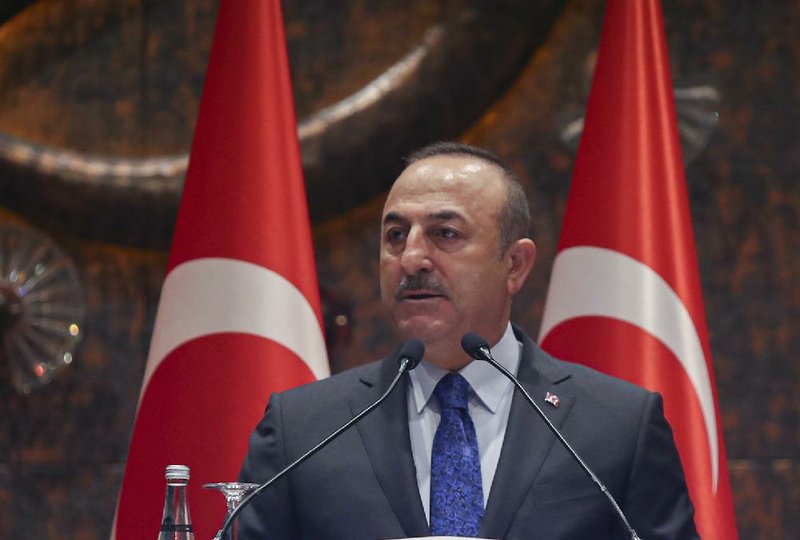ANKARA, Turkey -- Turkey's president said Tuesday that his country won't allow Syrian forces to gain additional territory in a northern Syrian province, Turkish media outlets reported, a day after clashes between Turkish and Syrian forces killed soldiers on both sides.
Recep Tayyip Erdogan's comments came as Syrian forces reached the western gate of the rebel stronghold of Saraqeb in Idlib province in the north and the U.N. announced that more than half a million people have fled their homes since Dec. 1 because of the offensive.
"At the moment, Syria is trying to gain territory by forcing the innocent and poor people toward our border," private NTV television quoted Erdogan as telling journalists late Monday. "We won't give Syria the opportunity to gain territory."
Eight Turkish citizens were killed Monday in an exchange of shelling with Syrian government forces in Idlib.
The assault on the Turkish troops took place during a Syrian government offensive that has been advancing since December into the country's last rebel stronghold, which spans Idlib province and parts of nearby Aleppo. Turkish troops are deployed in some of those rebel-held areas to monitor an earlier cease-fire that has since collapsed.
On Tuesday, Syrian government forces advanced north under the cover of airstrikes, reaching areas held by insurgents for eight years. The bombardment forced more people to flee for safety in areas close to the Turkish border.
"Since the first of December, in just two months, more than 520,000 people have been displaced from their homes, the vast majority of them being women and children," said Jens Laerke, spokesman for the Office for the Coordination of Humanitarian Affairs.
"There are no safe places in Idlib, bombs fall everywhere and anywhere."
Laerke said that in the 10 days starting Jan. 20, the U.N. rights office verified at least 83 civilians, including 20 women and 33 children, were killed and dozens more wounded in airstrikes and ground attacks.
The Britain-based Syrian Observatory for Human Rights, an opposition war monitor, said that in recent weeks Syrian troops have captured more than 60 towns, villages and hamlets. The captures happened as Syrian forces try to open a highway linking the capital, Damascus, with the northern city of Aleppo, Syria's largest. Rebels have closed the highway in Idlib since 2012 and Saraqeb is the last major rebel-held town in their way.
On Monday, Turkish artillery targeted Syrian government forces in northern Idlib, responding to shelling that killed seven Turkish soldiers and a Turkish civilian. A Syrian war monitor said 13 Syrian troops were killed in the clash.
The deadly exchange increased tensions between the neighboring countries and threatened to drive a wedge between Russia and Turkey, which have sought to coordinate their actions in Syria.
Earlier on Tuesday, Turkish Foreign Minister Mevlut Cavusoglu said Ankara and Moscow were trying to keep peace efforts for Syria alive. He renewed a call for Russia to "rein in" Syrian government forces and reiterated Turkey's determination to retaliate against any future Syrian attack on its troops.
"The Astana and Sochi peace processes have not been completely destroyed but have lately started to suffer and to lose importance," Cavusoglu said in Ankara, referring to Russian-Turkish peace initiatives that also have involved Iran.
He said Turkish officials were in contact with Russian counterparts "to keep the Astana and Sochi processes alive, to strengthen them, and to arrive at a political solution."
Cavusoglu, who held a telephone conversation with Russian Foreign Minister Sergey Lavrov hours after the Turkey-Syria clash, added: "The regime's aggressiveness has to be stopped immediately. That was the message I gave Lavrov yesterday."
Cavusoglu dismissed claims by Russia that it cannot fully control the Syrian government and said the attack occurred despite a previous notification by Turkey of its troops' coordinates in Idlib. Russia insisted Turkey failed to notify the Russian military about troop movements overnight.
Funerals were being held across Turkey for the Turkish servicemen killed. The deaths marked one of the highest single-day tolls for Turkish troops in Syria.
Meanwhile, Syrian state news agency SANA reported technicians began repairing damage caused by a "terrorist attack" Tuesday on five oil and gas facilities in central Homs province, including one of the country's two oil refineries. It said a fire was extinguished shortly after the facilities were shelled.
Three of the facilities attacked had been hit in December in an apparent drone attack.
No one claimed responsibility for the attack, the fourth against oil and gas facilities in the country in less than a year. The Islamic State group is known to have sleeper cells in the area.
Information for this story was contributed by Jamey Keaten and Bassem Mroue of The Associated Press.
A Section on 02/05/2020
